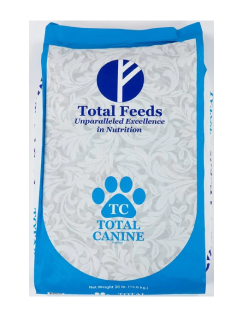
DogFoodAdvisor is reader supported See how
All reviews are 100% impartial but if you buy using links on this page, we may earn a referral fee.
Total Canine Dog Food receives the Advisor’s second-lowest tier rating of 2 stars.
The Total Canine product line includes one dry dog food, a recipe claimed to meet AAFCO nutrient profiles for all life stages.
Important: Because many websites do not reliably specify which Growth or All Life Stages recipes are safe for large breed puppies, we do not include that data in this report. Be sure to check actual packaging for that information.
Total Canine
Estimated Dry Matter Nutrient Content
Protein
Fat
CarbsCarbohydrates
Porcine meat meal, sorghum, rice bran, rice, chicken fat, barley, chicken meal, dried beet pulp, dried seaweed meal fucacceae, natural flavors, potassium chloride, salt, choline chloride, magnesium oxide, calcium carbonate, Lactobacillus acidophilus fermentation product dehydrated, Bifidobacterium bifidum fermentation product dehydrated, Enterococcus faecium fermentation product dehydrated, corn oil, dl-methionine, manganese amino acid chelate, manganese chloride, ascorbic acid, ferrous sulfate, copper amino acid chelate, copper chloride, vitamin B12 supplement, niacin supplement, thiamine mononitrate, d-calcium pantothenate, vitamin A supplement, pyridoxine hydrochloride, vitamin D3 supplement, cobalt carbonate, folic acid, butylated hydroxyanisole, and butylated hydroxytoluene
Fiber (estimated dry matter content) = 3.9%
Red denotes any controversial items
| Estimated Nutrient Content | |||
|---|---|---|---|
| Method | Protein | Fat | Carbs |
| Guaranteed Analysis | 24% | 18% | NA |
| Dry Matter Basis | 27% | 21% | 44% |
| Calorie Weighted Basis | 23% | 41% | 36% |
The first ingredient in this dog food is porcine meat meal. Pork meal is considered a meat concentrate and contains nearly 300% more protein than fresh pork. Yet it can also be high in ash — about 25-30%.
However, the ash content of the final product is typically adjusted in the recipe to allow its mineral profile to meet AAFCO guidelines.
The second ingredient is sorghum. Sorghum (milo) is a starchy cereal grain with a nutrient profile similar to corn.
Since it is gluten-free and boasts a smoother blood sugar behavior than other grains, sorghum may be considered an acceptable non-meat ingredient.
The third ingredient is rice bran, a healthy by-product of milling whole grain rice. The bran is the fiber-rich outer layer of the grain containing starch, protein, fat as well as vitamins and minerals.
The fourth ingredient is rice. Is this whole grain rice, brown rice or white rice? Since the word “rice” doesn’t tell us much, it’s impossible to judge the quality of this item.
The fifth ingredient is chicken fat. Chicken fat is obtained from rendering chicken, a process similar to making soup in which the fat itself is skimmed from the surface of the liquid.
Chicken fat is high in linoleic acid, an omega-6 fatty acid essential for life. Although it doesn’t sound very appetizing, chicken fat is actually a quality ingredient.
The sixth ingredient is barley. Barley is a starchy carbohydrate supplying fiber and other healthy nutrients. However, aside from its energy content, this cereal grain is of only modest nutritional value to a dog.
The seventh ingredient is chicken meal, another protein-rich meat concentrate.
The eighth ingredient is beet pulp. Beet pulp is a controversial ingredient, a high fiber by-product of sugar beet processing.
Some denounce beet pulp as an inexpensive filler while others cite its outstanding intestinal health and blood sugar benefits.
We only call your attention here to the controversy and believe the inclusion of beet pulp in reasonable amounts in most dog foods is entirely acceptable.
The ninth ingredient is dried seaweed meal, a product made from a family of brown algae known as Fucaceae (Rockweed). Although it does contain a number of healthy nutrients, seaweed meal is primarily used as a source of inexpensive carbohydrates (about 60% dry matter).
This item is only rarely used to make pet food and is more typically found in feeds for cattle, horses, hogs, hens and sheep.
From here, the list goes on to include a number of other items.
But to be realistic, ingredients located this far down the list (other than nutritional supplements) are not likely to affect the overall rating of this product.
With four notable exceptions…
First, corn oil has one of the highest (and most unfavorable) omega-6 to omega-3 fatty acid ratios of any vegetable oil. Compared to almost any named animal fat, corn oil cannot be considered a quality ingredient.
Next, we note the inclusion of dried fermentation products in this recipe. Fermentation products are typically added to provide enzymes to aid the animal with digestion.
In addition, this food includes chelated minerals, minerals that have been chemically attached to protein. This makes them easier to absorb. Chelated minerals are usually found in better dog foods.
And lastly, this food is preserved with BHA and BHT. Both of these chemical additives are suspected cancer-causing agents (carcinogens).
Total Canine Dog Food Review
Judging by its ingredients alone, Total Canine dog food looks like a below-average dry product.
But ingredient quality by itself cannot tell the whole story. We still need to estimate the product’s meat content before determining a final rating.
The dashboard displays a dry matter protein reading of 27%, a fat level of 21% and estimated carbohydrates of about 44%.
And a fat-to-protein ratio of about 75%.
Near-average protein. Above-average fat. And below-average carbs when compared to a typical dry dog food.
Free of any plant-based protein boosters, this looks like the profile of a kibble containing a moderate amount of meat.
However, with 41% of the total calories in this recipe coming from fat versus just 23% from protein, this food may not be suitable for every animal.
Bottom line?
Total Canine is a plant-based dry dog food using a moderate amount of named meat as its main source of animal protein, thus earning the brand 2 stars.
Not recommended.
Please note certain recipes are sometimes given a higher or lower rating based upon our estimate of their total meat content and (when appropriate) their fat-to-protein ratios.
Total Canine Dog Food Recall History
The following list (if present) includes all dog food recalls since 2009 directly related to this product line. If there are no recalls listed in this section, we have not yet reported any events.
You can view a complete list of all dog food recalls sorted by date. Or view the same list sorted alphabetically by brand.
To learn why our ratings have nothing to do with a product’s recall history, please visit our Dog Food Recalls FAQ page.
Get free dog food recall alerts sent to you by email. Subscribe to The Advisor’s recall notification list.
Dog Food Coupons and Discounts
Readers are invited to check for coupons and discounts shared by others in our Dog Food Coupons Forum.
Or click the buying tip below. Please be advised we receive a fee for referrals made to the following online store.
Notes and Updates
Compare This Dog Food
How does this brand compare with The Dog Food Advisor's most recommended brands?
A Final Word
The Dog Food Advisor does not accept money, gifts, samples or other incentives in exchange for special consideration in preparing our reviews.
However, we do receive a referral fee from online retailers (like Chewy or Amazon) and from sellers of perishable pet food when readers click over to their websites from ours. This helps cover the cost of operation of our free blog. Thanks for your support.
For more information, please visit our Disclaimer and Disclosure page.








